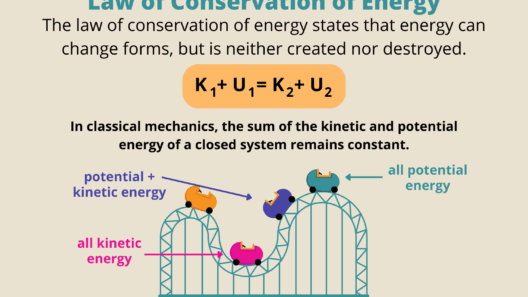Conserving energy is an imperative aspect of modern living that has profound ramifications for both our environment and our economy. As the urgency of climate change escalates, a concerted effort to reduce energy consumption becomes increasingly critical. This article will delve into the myriad reasons why energy conservation holds paramount importance, examining its environmental, economic, and social dimensions.
Understanding the significance of conserving energy is essential not only for individuals but also for industries and governments alike. By collectively committing to energy conservation, we can mitigate adverse environmental impacts while promoting sustainability for our future generations.
Environmental Ramifications of Energy Waste
The environmental consequences of excessive energy consumption cannot be overstated. The majority of energy used globally is derived from fossil fuels, which release greenhouse gases into the atmosphere upon combustion. These emissions contribute significantly to global warming—a phenomenon responsible for catastrophic events such as rising sea levels, increased frequency of natural disasters, and disruptions to biodiversity.
Energy conservation plays a pivotal role in combating climate change. By reducing our energy demand, we diminish the need for fossil fuel extraction, processing, and utilization. This, in turn, leads to a decrease in harmful emissions, thereby improving air quality and safeguarding ecosystems. Moreover, it allows for a greater reliance on renewable energy sources, such as solar, wind, and hydro, which have lower environmental footprints.
Furthermore, conserving energy helps preserve natural resources. The extraction of coal, oil, and natural gas can result in habitat destruction, water pollution, and soil degradation. By minimizing energy consumption, we alleviate pressure on these valuable resources, allowing ecosystems to recover and thrive. Through responsible energy use, we foster a more balanced relationship with our planet.
Economic Benefits of Energy Conservation
Energy conservation not only offers ecological advantages but also possesses salient economic benefits that cannot be ignored. Businesses and homeowners alike can experience significant savings on utility bills by implementing energy-efficient practices and technologies. Simple adjustments, such as using energy-efficient appliances, insulating homes, and utilizing smart thermostats, can lead to substantial reductions in energy expenditures.
Moreover, energy conservation supports job creation in the burgeoning green energy sector. As industries pivot towards more sustainable practices, the demand for energy audits, efficiency improvements, and renewable energy installations grows. This shift not only stimulates economic growth but also fosters innovation as businesses develop new technologies to meet efficiency standards.
Additionally, governments can benefit economically from reducing energy consumption. By investing in energy efficiency programs and incentivizing renewable energy utilization, countries can lower their dependence on imported fuels, enhancing energy security. This strategic shift can lead to reduced trade deficits and increased national sovereignty over energy resources, thereby strengthening a nation’s economic resilience in the face of global market fluctuations.
Social Implications of Energy Conservation
The social dimension of energy conservation encompasses its impact on communities and quality of life. Access to affordable energy is a fundamental necessity, and energy efficiency can significantly alleviate the burden on low-income households. By lowering energy costs, families can allocate resources towards other vital needs such as healthcare, education, and food security, ultimately leading to improved overall well-being.
Additionally, energy conservation fosters a sense of community and collective responsibility. When individuals and organizations band together to implement energy-saving measures, they cultivate a culture of sustainability that transcends geographical and socio-economic boundaries. This collaborative spirit not only empowers communities but also educates them about the importance of environmental stewardship.
The Role of Policy in Promoting Energy Conservation
Effective policies and regulations are essential in encouraging energy conservation on both a local and national scale. Governments can enact legislation promoting energy efficiency standards, incentivizing renewable energy adoption, and providing subsidies for energy-saving technologies. By establishing frameworks that prioritize sustainable practices, policymakers can guide industries and consumers toward making informed energy choices.
In addition, public awareness campaigns and educational initiatives play a vital role in shaping attitudes towards energy conservation. By informing citizens about the environmental and economic impacts of their energy consumption, communities can be empowered to make significant changes in their daily habits. This grassroots understanding can catalyze larger systemic changes that promote a shared vision for a sustainable future.
Facing the Challenges of Energy Conservation
Despite the clear benefits, energy conservation efforts face various challenges. Resistance to change, complacency, and lack of awareness can hinder progress. Additionally, some individuals may perceive conservation measures as inconvenient or costly. Therefore, it is essential to communicate the long-term benefits clearly and empathetically, showcasing the immediate gains alongside the broader environmental imperative.
As technology advances, innovative solutions will continue to emerge, making energy conservation more accessible and practical for households and businesses. The rise of smart technology, for instance, allows for enhanced monitoring and management of energy consumption, paving the way for more informed decision-making.
Conclusion: A Call to Action
In light of the mounting environmental challenges and economic pressures facing our society, the urgency of conserving energy has never been more pressing. Individuals, businesses, and policymakers must collaborate towards a common goal of reducing energy consumption. By valuing sustainability and adopting energy-efficient practices, we stand a better chance of ensuring a habitable, prosperous planet for generations to come.
Ultimately, conserving energy is not merely an environmental necessity; it is a pathway to economic advantage and social equity. The time to act is now, and the choice to conserve energy is in our hands. Embrace this critical responsibility, and be a part of the solution for a sustainable future.








